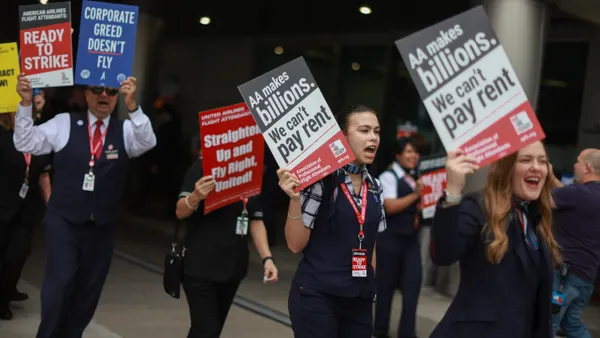Here's a statistic that's likely to make benefits administrators roll their eyes and maybe scream: On average, workers spend 18 minutes enrolling in benefits, according to a recent report. It makes one wonder how those 18 minutes stack up to the hours, days and weeks HR pros put toward benefits? But maybe that's a ratio better left uncalculated.
Still, enrollment season has arrived. If Twitter activity is any indication, this time of year can cause benefits administrators some stress.
It’s the time of year when I start to feel overwhelmed at work, with OE and year end approaching. This year is compounded by managerial responsibilities, retirement plan math, and trying to partially remodel a house. Remind me again how #HRSelfCare works? pic.twitter.com/5YpmgKKwwU
— April Dowling (@adowling) September 24, 2019
With preparation, teamwork and regularly scheduled lunch breaks, HR pros can survive open enrollment and all it entails. Below, HR Dive has compiled five tips from benefits experts for anyone developing an open enrollment strategy.
1. Make a plan
To employees, open enrollment is confined to one period of time. That's not true for HR professionals working in benefits, according to Julie Stich, vice president of content at the International Foundation of Employee Benefit Plans: "It's usually three to five months of craziness, but the seeds of it are all year long."
To survive the craziness, HR pros need a plan. "The first thing that has to be done is there has to be a plan — it's always good to create a plan with a timeline for open enrollment," Stich said.
This plan will need to be more than a to-do list, however. It needs to tie into HR's overall strategy for benefits, Stich said. Each year, for example, the employer needs to analyze how workers use their benefits to determine if any offerings "miss the mark." Stich recommended a few questions to spur benefits reflection: "Are the benefits being utilized? Are they being utilized correctly? Are they working efficiently? Are they crazy expensive?"
An open enrollment plan should also encompass employee communications, Stich said. "The more communications you do, the more successful you'll be," she said. There's a limit, however. If an HR department over communicates, workers may ignore its messaging and miss key information.
2. Get comfy with the calendar
April Dowling, human resources operations manager at RxBenefits, Inc., implements Stich's strategy on a granular level. Any task she needs to accomplish has a spot on her calendar — it's the chief tactic that gets her through the season, she said.
"If it's not on my calendar, it's not happening," she said. "That's how I remind myself to look at staff time cards to making sure I remember to go pick up dry cleaning. My brain gets so bogged down with actual benefits stuff that I forget small things."
3. Rely on teammates
HR departments with more than one person will need to rely on each other during open enrollment. "Don't forget to ask for help — it's okay," Dowling said. But teamwork involves communications, including interdepartmental communications. "Make sure everybody's on the same page," Stich said. Talk to c-suite members, those involved in payroll and anyone else who needs to weigh in on benefits decisions.
4. Let tech help
Employers can purchase many tech tools that may alleviate benefits administrators during open enrollment. "If the only option you have to manage your benefits is with a paper and a pen, you should do a little research because there are a plethora of providers," said David Reid, founder and CEO of Ease, a benefits administration software company.
Using such platforms, benefits administrators no longer need to collate forms, write memos and print material. "That goes away," Reid said. "You're not in the office late at night doing that." This technology won't eliminate a group administrator's role. "It's like going from a manual drill to a power drill," he said. "You still need the carpenter to do the job."
5. Take a lunch
As the tasks pile up, build in room for rest, Dowling suggested. "Take a lunch. You need a break," she said. "You can't do everything at one time. A mental break will be more beneficial than trying to push through anything you've got going on."













